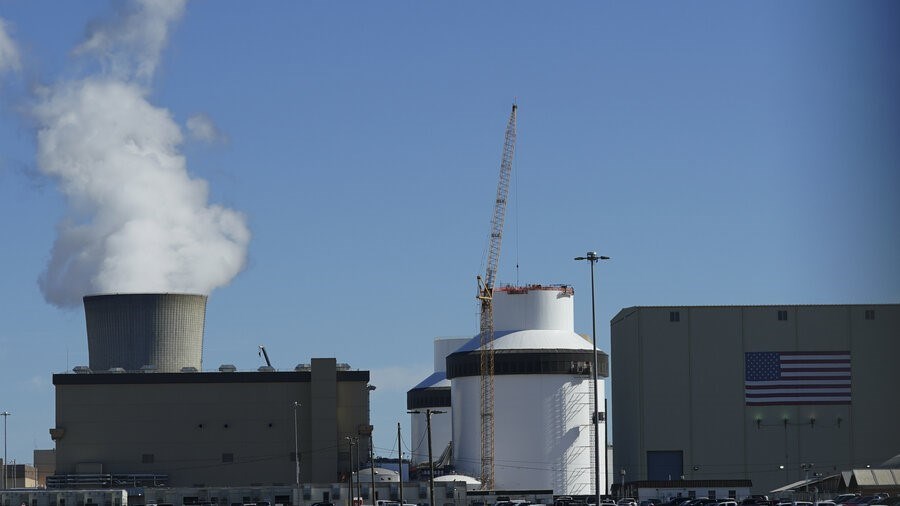REPRINTED WITH PERMISSION FROM THE CHRISTIAN SCIENCE MONITOR
 Reactor number 3 and its cooling tower stand at Georgia Power Co.'s Plant Vogtle nuclear power plant on Jan. 20, 2023, in Waynesboro, Georgia. This is the first nuclear plant built from scratch in the United States in decades. John Bazemore/AP
Reactor number 3 and its cooling tower stand at Georgia Power Co.'s Plant Vogtle nuclear power plant on Jan. 20, 2023, in Waynesboro, Georgia. This is the first nuclear plant built from scratch in the United States in decades. John Bazemore/AP
March 7, 2023
Georgia Power Co. announced one of its two new reactors reached self-sustaining nuclear fission on Monday. The announcement is a key step toward reaching commercial operation of nuclear energy in the United States.
A nuclear power plant in Georgia has begun splitting atoms in one of its two new reactors, Georgia Power said Monday, a key step toward reaching commercial operation at the first new nuclear reactors built from scratch in decades in the United States.
The unit of Atlanta-based Southern Co. said operators reached self-sustaining nuclear fission inside the reactor at Plant Vogtle, southeast of Augusta. That makes the intense heat that will be used to produce steam and spin turbines to generate electricity.
A third and a fourth reactor were approved for construction at Vogtle by the Georgia Public Service Commission in 2009, and the third reactor was supposed to start generating power in 2016. The company now says Unit 3 could begin commercial operation in May or June.
Unit 4 is projected to begin commercial operation sometime between this November and March 2024.
The cost of the third and fourth reactors was originally supposed to be $14 billion. The reactors are now supposed to cost more than $30 billion. That doesn’t include the $3.68 billion that the original contractor Westinghouse paid to the owners after going bankrupt, which brings total spending to more than $34 billion.
The latest set of delays at Unit 3 included a pipe part of a critical backup cooling system that was vibrating during startup testing. Construction workers had failed to install supports called for on blueprints. The company has also said it had to repair a slowly dripping valve and diagnose a problem involving water flow through reactor coolant pumps.
Georgia Power said Unit 3 would continue startup testing to show that its cooling system and steam supply system will work at the intense heat and pressure that a nuclear reactor creates. After that, operators are supposed to link the reactor to the electrical grid and gradually raise it to full power.
“We remain focused on safely bringing this unit online, fully addressing any issues and getting it right at every level,” Chris Womack, chairman, president, and CEO of Georgia Power, said in a written statement. “Reaching initial criticality is one of the final steps in the startup process and has required tremendous diligence and attention to detail from our teams.”
Georgia Power owns a minority of the two new reactors. The remaining shares are owned by Oglethorpe Power Corp., the Municipal Electric Authority of Georgia, and the city of Dalton. Oglethorpe and MEAG would sell power to cooperatives and municipal utilities across Georgia, as well as in Jacksonville, Florida, parts of Alabama, and the Florida Panhandle.
Georgia Power’s 2.7 million customers are already paying part of the financing cost, and state regulators have approved a monthly rate increase of $3.78 a month as soon as the third unit begins generating power. The elected Georgia Public Service Commission will decide later who pays for the remainder of the costs.
Vogtle is the only nuclear plant under construction in the U.S. Its costs and delays could deter other utilities from building such plants, even though they generate electricity without releasing climate-changing carbon emissions.
This story was reported by The Associated Press.
Related stories
Page created on 3/14/2023 7:34:20 PM
Last edited 3/14/2023 8:05:18 PM
